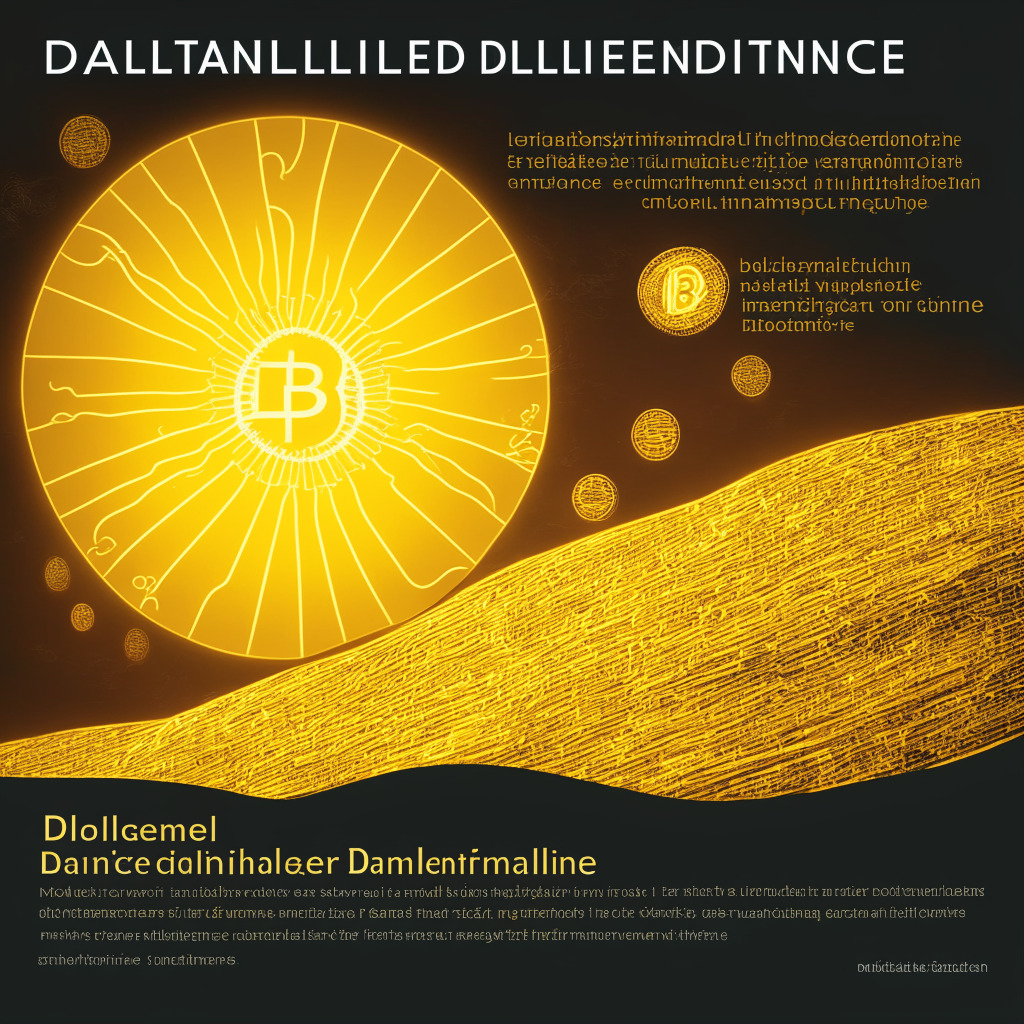The future of finance could involve a unified electronic ledger merging central bank digital currencies with tokenized assets, streamlining transactions and improving global financial systems, according to a Bank for International Settlements report. Key benefits include automated smart contracts, reduced trade costs, and seamless cross-border operations.
Search Results for: National Financial System
IMF’s Vision for a Global CBDC System: Revolutionizing Cross-Border Payments
IMF’s Tobias Adrian proposes a global central bank digital currency (CBDC) system called “XC” platform, aiming to address issues such as high costs and slow processing in cross-border payments. Utilizing a trusted global ledger, the system enables efficient international transactions without introducing middleware cryptocurrencies, while automating contracts and maintaining central banks’ control over reserve allocation.
Crypto CEO’s Fake Passport Fiasco: Exploring Third-Party Risks & International Prosecution
Terraform Labs founder and CEO Do Kwon blames a “Chinese-named agency” for providing him with forged travel documents, leading to his arrest in Montenegro. With ongoing legal proceedings and requested extradition, the future of Terraform Labs and LUNC prices hang in the balance.
Skipping Interest Rate Hike: Economic Savior or Catastrophe? Crypto’s Role in Financial Turmoil
Federal Reserve Chairman Jerome Powell opts to “skip” a round of rising interest rates amid mixed reactions. As inflation reaches a 40-year high and citizens report higher living costs, some analysts believe the decision might do more harm than good. This scenario also highlights the varying roles and adoption of cryptocurrencies across different countries.
Digital Dollar: Evaluating CBDC Benefits, Risks, and Privacy Concerns in the Financial Landscape
The US Treasury explores the potential of a central bank digital currency (CBDC) for improving payment efficiency and financial inclusion. However, risks, privacy concerns, and design decisions could impact benefits. Careful design and implementation are crucial for the digital dollar’s future.
US CBDC Dilemma: Balancing Privacy, Security, and Financial Inclusion in a Digital Era
The Treasury Department leads an interagency working group studying a potential U.S. central bank digital currency (CBDC). As digital currencies gain traction, finding a balance between innovation, trust, protection, privacy, and financial inclusion is crucial for the nation’s digital financial future.
XRP vs Bitcoin: The Battle for Crypto Supremacy and Financial Integration
XRP, Ripple Labs’ efficient cryptocurrency, aims to improve the banking system rather than replace it, distinguishing it from Bitcoin. Despite facing regulatory challenges, XRP supporters believe in its potential for widespread adoption and coexistence with traditional financial systems, offering a more efficient and sustainable solution.
De-Dollarization: Implications for Crypto, Gold and the Global Financial System
De-dollarization is gaining momentum, with countries seeking alternatives to the U.S. dollar for international transactions and debt settlements. This shift could create opportunities for assets like gold and cryptocurrencies, but also carries risks, such as market instability and challenges in adopting disruptive forms of money.
Aligning Ukraine’s Crypto Regulations with EU Standards: Balancing Consumer Protection, Financial Stability, and Market Growth
The National Bank of Ukraine (NBU) is working towards aligning the country’s crypto regulations with European standards, particularly the EU’s Markets in Crypto-Assets (MiCA) legislation. The NBU emphasizes maintaining financial stability, consumer protection, and transparency, while considering Ukraine’s unique legal and financial systems.
BRZ Stablecoin: Gateway to Financial Inclusion or a Tool for the Elite in Brazil and Argentina?
Thiago Cesar’s Transfero offers BRZ, the first stablecoin pegged to the Brazilian real, with the potential to transform the financial markets in Brazil and Argentina. Transfero addresses issues like asset protection and international remittance, but critics question if it promotes greater financial inclusion or benefits a select few.
TASE’s Blockchain PoC Success: Tokenizing Bonds, Fiat & Future Impact on Financial Industry
The Tel Aviv Stock Exchange (TASE) completed the proof of concept phase of Project Eden, exploring blockchain technology for issuing and settling government bonds. The PoC featured tokenization of the Israeli Shekel and used Ethereum Virtual Machine-compatible blockchain, with support from major international and local banks.
Risky Payment Apps vs Secure Bitcoin: Navigating FDIC Protection & Financial Security
The Consumer Financial Protection Bureau (CFPB) warns that funds stored in popular payment apps may not be insured, highlighting possible financial uncertainties. Bitcoin, with its decentralized nature and self-sovereignty, gains attention as a secure alternative providing users sole ownership and control over their funds, unlike payment apps.
Colombia’s Crypto Boom: Financial Inclusion Meets Regulatory Challenges
Colombia has witnessed a surge in crypto adoption, with Bitso trading platform experiencing a tenfold increase in retail clients since last year. The country’s potential for mainstream crypto adoption offers opportunities for broader financial inclusion and effective tax collection measures. However, clear regulations and policies are crucial to ensure investor protection and long-term viability of the crypto ecosystem within Colombia.
India’s e-Rupee Advancements: Boon or Bane for the Nation’s Financial Landscape?
India’s Reserve Bank is advancing its efforts in developing a digital rupee, with satisfactory results from two central bank digital currency test projects. Although this initiative holds potential to transform India’s financial landscape, concerns regarding technology, implementation, and security must still be addressed.
Russia Abandons National Crypto Exchange Plans, Focuses on Regulating Multiple Platforms
Russia has abandoned plans for a national cryptocurrency exchange and is now focusing on establishing rules and regulations for multiple crypto trading platforms, prioritizing regulation. This shift aims to create a robust and secure ecosystem for digital assets while addressing challenges like security and investor protection.
Web3 and Financial Services: Balancing Innovation, Regulation, and Market Stability
The Federal Reserve Bank of Atlanta’s Policy Hub report discusses Web3’s implications for financial services, touching upon blockchains, DeFi, financial infrastructure, regulatory challenges of DAOs, and central bank digital currencies (CBDCs), highlighting the importance of balancing innovation and regulation.
Norway’s Central Bank Pushes for National Crypto Strategy Amid EU’s MiCA Regulation
Norway’s central bank, Norges Bank, urges the country to develop a national crypto regulation strategy as the EU’s MiCA regulation approaches. Despite MiCA’s focus on consumer protection and market integrity, it lacks comprehensive decentralized finance regulation. Norges Bank emphasizes the importance of understanding the evolving crypto landscape to foster responsible growth and innovation.
US Bank Mergers: Solving the Crisis or Creating Riskier Financial Giants? Debating Pros and Cons
US Treasury Secretary Janet Yellen discussed the possibility of more bank mergers amid the ongoing banking crisis. However, concerns arise over the growing power of financial giants, potentially posing a threat to Americans and the economy. The delicate balance between ensuring stability and preventing “too big to fail” institutions remains a challenge.
Debt Ceiling Debate and the Future of Blockchain: Implications for the Global Financial System
The ongoing U.S. debt ceiling debate could impact traditional finance and the blockchain and cryptocurrencies’ future. A U.S. default could reshape the global financial system, potentially increasing Bitcoin’s role in international trade and highlighting the need for blockchain solutions for a more stable future.
G-7’s Commitment to Crypto Regulations: Balancing Innovation and Financial Stability
The G-7 countries announced their commitment to enforcing forthcoming cryptocurrency regulations proposed by the Financial Stability Board (FSB) and the International Monetary Fund (IMF), aiming to boost confidence in the growing crypto industry and create a safer, more transparent environment for all participants.
Florida’s Anti-CBDC Bill: Protecting Financial Stability or Stifling Innovation?
Florida Governor Ron DeSantis signed a bill restricting central bank digital currencies (CBDCs) use in the state, stirring heated debates. Critics argue it restricts innovation and impedes competitiveness, while supporters claim it protects Florida’s financial system from potential risks associated with CBDCs.
Unlocking the Potential of Offline CBDCs: Balancing Privacy, Security, and Financial Inclusion
The BIS Innovation Hub has published a handbook to assist central banks in implementing offline CBDC technology, aiming to advise on security measures, risks, privacy considerations, and resilience options. The guide highlights the potential benefits of enabling offline use for CBDCs in achieving public policy objectives aligned with central banks’ mandates.
Hungary’s Cautious Approach to CBDCs: Balancing Innovation, Privacy, and Financial Inclusion
The Hungarian Central Bank takes a cautious approach to central bank digital currencies (CBDCs) as it evaluates the need for a large-scale retail CBDC, considering the country’s demographics and financial inclusivity. As CBDC adoption raises privacy and financial security concerns, Hungary seeks to maintain financial stability while exploring digital currency possibilities.
Argentina’s Crypto Clampdown: Balancing Economic Protection vs. Financial Freedom
Argentina’s central bank bans payment platforms from offering cryptocurrencies, impacting companies like Ualá and Mercado Libre. Amidst high inflation, the clampdown aims to mitigate risks and protect customers, potentially limiting Argentinians seeking to safeguard savings amidst economic turmoil.
Bank Collapses Fuel Crypto Adoption: Risks and Rewards in a Turbulent Financial Landscape
The recent collapse of major banks has raised concerns about financial infrastructure stability, leading to increased skepticism about centralized banking policies. This may result in a significant rise in cryptocurrency and NFT prices, with more people turning to Web3 alternatives for improved flexibility, efficiency, and decentralized finance solutions across multiple industries.
Bitcoin vs Interest Rates: How Fed Decisions Affect BTC’s Future & Stability in Financial Markets
Bitcoin price is yet to regain the $29,200 level and is influenced by the expectation of U.S. Federal Reserve’s interest rate increase. Analyzing excessive leverage, professional traders’ actions with BTC derivatives, futures, and options, Bitcoin might benefit from the Treasury injecting more money into the economy, regardless of the Fed’s interest rate decision.
Coinbase Launches International Exchange: A Boon or Bane for Crypto Adoption and Regulation?
Coinbase has launched a new service, Coinbase International Exchange, enabling institutional users outside the U.S. to trade bitcoin and ethereum perpetual futures. The platform aims to make crypto products more accessible globally, though concerns include increased competition and potential challenges for retail traders.
Ditching Dollar Dilemma: BRICS Nations Debate Pros and Cons in International Settlements
BRICS nations are currently debating the merits and drawbacks of abandoning the U.S. dollar in […]
China’s Digital Yuan Invites Tourists – Steps Towards Global Crypto Acceptance or Potentiable Pitfall?
“China expands the utility of its Digital Yuan App to include tourist-friendly features. The latest update allows visitors to pre-charge their wallets using VISA and Mastercard, driving China’s intentions to establish e-CNY as a commonplace retail option, marking a significant step in the evolution of global digital currencies.”
BRICS Nations Contemplating Alternative Trade Currency: Challenging the US Dollar’s Dominance
BRICS nations contemplate alternatives to reduce reliance on the faltering US dollar, with Brazil’s President Lula supporting a new currency for trade between BRICS countries. This challenges the US dollar’s dominance and could reshape the global financial order.
Estonia’s Crypto Crackdown: Balancing Tech Adoption and Regulatory Compliance
Estonia enhanced its AML laws, impacting 400 Virtual Asset Service Providers (VASPs) that voluntarily shut down or lost authorizations. Despite stricter regulations, Estonia hosts 100 active crypto firms, showcasing the challenge of balancing safety and innovation in the crypto ecosystem.
Liechtenstein Accepts Bitcoin for Public Services: A Step Towards a Crypto-Friendly Economy
Liechtenstein’s Prime Minister, Daniel Risch, announced plans for the government to accept Bitcoin as a payment method for public services, highlighting the nation’s interest in blockchain technologies. Liechtenstein’s proximity to the European Economic Area and its dedicated crypto regulations through the Liechtenstein Blockchain Act make it a burgeoning European crypto hub, attracting crypto businesses and adapting to the evolving global market.































